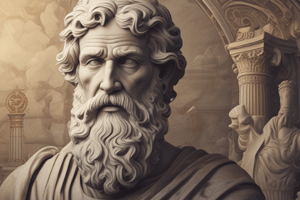Podcast
Questions and Answers
Plato's Ion is a purely earnest dialogue with a definite result
Plato's Ion is a purely earnest dialogue with a definite result
False (B)
Genius is often believed to be a gift of nature
Genius is often believed to be a gift of nature
True (A)
Ion's own recitations illustrate the power of dramatic performances over the mind of the performer
Ion's own recitations illustrate the power of dramatic performances over the mind of the performer
True (A)
Socrates shows no sympathy for the poetic nature in the dialogue
Socrates shows no sympathy for the poetic nature in the dialogue
The concentration of the mind on a single object always leads to a clear and orderly perception of the whole
The concentration of the mind on a single object always leads to a clear and orderly perception of the whole
The old quarrel between philosophy and poetry is already working in the mind of Plato
The old quarrel between philosophy and poetry is already working in the mind of Plato
Plato's Ion is a purely earnest dialogue with a definite result
Plato's Ion is a purely earnest dialogue with a definite result
Socrates shows sympathy with the poetic nature in the dialogue
Socrates shows sympathy with the poetic nature in the dialogue
The greatest strength is observed to have an element of limitation
The greatest strength is observed to have an element of limitation
Imagination is never at war with reason and fact
Imagination is never at war with reason and fact
Flashcards are hidden until you start studying
Study Notes
Plato's Ion Dialogue
- The dialogue is purely earnest and has a definite result
- The concept of genius is often seen as a natural gift
The Power of Dramatic Performances
- Ion's recitations demonstrate the impact of dramatic performances on the performer's mind
Socrates' View on Poetry
- Socrates shows no sympathy for the poetic nature in the dialogue, indicating a disagreement between philosophy and poetry
The Mind and Perception
- Focusing the mind on a single object leads to a clear and orderly perception of the whole
Limitations of Strength
- Every great strength has an element of limitation
Reason and Imagination
- Imagination is not in conflict with reason and fact
Studying That Suits You
Use AI to generate personalized quizzes and flashcards to suit your learning preferences.




